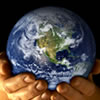Visiting expert: The earth is very, very old
Richard Carlson, a pioneer in the study of the Earth's geological evolution, will discuss determining the age of our planet Wednesday.

Dr. Richard Carlson, a pioneer in the study of the geologic evolution of the Earth, will speak on "A History of Earth's Formation" as SMU's 2008 Hamilton Visiting Scholar in the Huffington Department of Earth Sciences in Dedman College.
Carlson, a senior geochemist at the Department of Terrestrial Magnetism at the Carnegie Institution of Washington, will deliver his free public lecture Nov. 12 at 7 p.m. in the Collins Executive Education Center's Crum Auditorium at SMU.
Carlson and his colleagues at the Carnegie Institution recently determined that samples of rock they collected from the Nuvvuagittuq region of Quebec were 4.28 billion years old -- 250 million years older than any previously discovered rocks.
Radioactive elements act as clocks to enable scientists to explain the chronology of the processes that resulted in Earth's formation -- from the element formation in the stars of the Milky Way, to the collision that formed the Earth-Moon system and finally to the stabilization of the various structures of the Earth. Carlson's research topics range from chronological investigations of early igneous processes on small planetary objects (like meteorites) to broad chemical and physical studies of crust-forming processes on Earth.
For information call 214-768-2750.